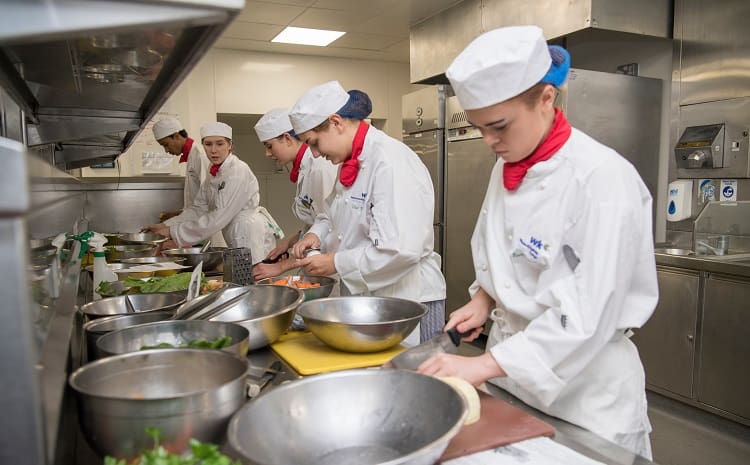By Katherine Price, Sustainability Editor, H&C News: How important is sustainability to the next generation of hospitality talent?

Recruitment and retention – or building a regenerative team – remains one of the biggest challenges and priorities for hospitality businesses, but we don’t necessarily hear the voices of the next generation about their perspectives on the industry and why it is, or isn’t, a sector of choice for them.
The scale of the problem has been highlighted by data suggesting that a third of businesses were expecting to reduce their opening hours over the festive period due to staff shortages, and Hospitality & Catering News hosted a round table earlier this year discussing how employers can communicate their sustainability credentials to prospective talent.
Umbrella Training just last month published its Perceptions of hospitality report, which surveyed more than 2,000 young people in the UK, and concluded that “Gen Z wants to feel challenged and be heard, whether in their commitment to tackling climate change or in their desire for sustainable, diverse, equitable and accessible workplaces”.
I spoke to two BA Hotel Management graduates from the Edge Hotel School who recently joined Whatley Manor in Malmesbury, Wiltshire, attracted by the five-red-AA-starred property’s ambitious ESG goals.
“In my personal life I make a lot of sustainable choices… so it was a question of finding a workplace that has the same values as me, where I can learn a lot too, and take what I’ve learned in my personal life and see it on a larger scale and how guests are then inspired to change,” says Emily Clark, one of the new recruits who has been posted in the food and beverage team. Her career goal is to one day have her own vegan restaurant and organic, biodiverse vineyard.
Sebastian Schraag, meanwhile, will be rotated around various departments and is currently in housekeeping. Sustainability was a key influence on his decision to join the 23-bedroom hotel and was the focus of his dissertation.
“For me, it was a very large factor. It’s already such a big topic, sustainability, but what I’ve seen during my application processes was that not a lot of companies were putting their money where their mouth was,” he explains.
In his dissertation, he undertook a survey which suggested that guests staying in hotels operating under strong sustainable principles would be inclined to adopt sustainable actions in their own personal lives, illuminating for him the influence that hospitality can have on the public.
Schraag also felt the sustainability training and learning framework that Whatley has in place for team members would look good on his CV and provide him with a solid understanding of sustainable hotel management, which is set to be critical to business success in the future.
“It’s a huge topic but one that my generation especially is very aware of. As we come out into the industry and senior management positions it’s going to be at the very forefront of everything that we are then doing,” agrees Clark.
“Knowing that it’s going to be a core life and business skill, you need to get this in a meaningful way onto your CV, is a key way to communicate it to the next generation of graduates,” adds general manager Sue Williams.
But how can hospitality employers communicate to the next generation that its environmental and social impact are a priority for the business?
“Being completely transparent is a good place to start,” suggests Clark. Whatley not only monitors and has targets to reduce its carbon emissions, but this information is displayed in communal employee facilities.
“You can all see where the business wants to go and we can be involved in part of that journey,” adds Clark.
Schraag agrees that empowering the individuals in your business with an understanding of how they can contribute to that journey is important.
“I’m frequently asked, ‘how do you truly embed a sustainability culture within a team?’, and I have to say, it is truly tricky,” says Williams. “You’ve got to constantly keep that messaging and training going.”
Sustainability training and education is also being instilled in young hospitality professionals by educational institutions. Vince Kelly, manager of the Mayor’s Academy Hub at Westminster Kingsway College in London, says there is “increasing interest in and understanding of sustainability” among culinary students.
His role involves identifying gaps in the curriculum, and as an ambassador for WRAP’s Guardians of Grub campaign, has a particular focus on food waste.
“The idea is to tie it into the curriculum in the long term. We have realistic work environments, we have three restaurants within the college, so we’re able to underpin it quite well within that,” he says.
This involves underpinning theory and resources with practical experience, such as weighing food waste in the kitchen so they can see how much has been wasted.
“We’re trying to progress it each year,” says Kelly, who plans to launch a food waste student ambassador programme across each year group next year, as well as a new module about nutrition underpinned by sustainability.
He also thinks the subject will get more coverage under the new T-Levels, suggesting the next generation of hospitality talent entering the workplace will not only potentially be more interested in sustainability, but will also be more clued-up on best business practice – and will have high expectations of employers as a result.
“This is an amazing topic to drive a team by and with,” says Williams, who stresses the importance of ensuring all members of your team can contribute in their own way towards your sustainability journey.
“There’s something in it for everybody. Because to go on this journey, you need the analytics, because there’s so much data involved in this whole process of carbon footprinting and monitoring. There needs to be space for the ‘people-people’ because you need to do community via your stakeholders, and the creatives, because innovation in this space is popping. You need people who can find new ways forward.”

